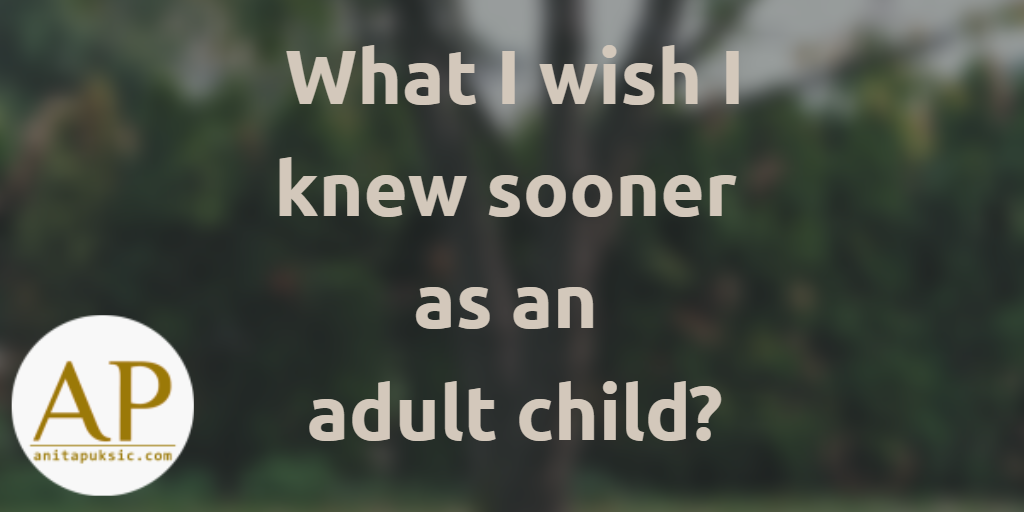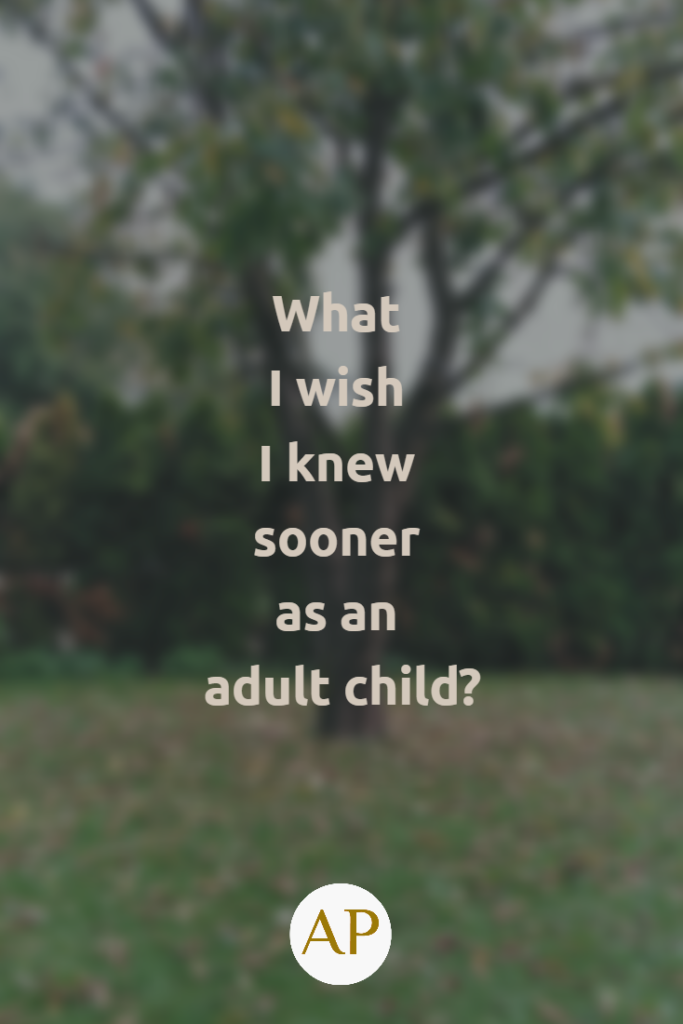
This is the intro post in the series “What I wish I knew sooner as an adult child”. Adult child is a term used for ADULTS (18, 21, 50, 86, 99 years old, it doesn’t matter) who as children grew up in a home where there was alcoholism or other addictions. It can also apply to people who grew up with chronically ill parents or caregivers. These series will be interesting to you, if you yourself are ACOA (adult children of alcoholic) or an adult child that grew up in an otherwise dysfunctional family, where you couldn’t simply be a child. It will also be interesting for you, if you are in any type of relationship with an adult child. The series will be mix of what I read, learned, observed and I will also share my personal stories and healing journey.
What I wish I knew sooner as an adult child?
List of all the posts in the series:
- Intro: What I wish I knew sooner as an adult child?
- You are not the one to blame for your parent’s addiction, depression, illness, death…
- How are guilt and shame holding you back from advancing in your career?
- Facing the reality of being raised by emotionally immature parents: Why you don’t want to do it and why you need to.
- Top 3 Must Read Books, if you are ACOA (adult child of an alcoholic or you are coming from an otherwise dysfunctional family)
Below you can find characteristics of adult children as described by Dr. Janet G. Woititz (I highly recommend her books – you can read them for free for 2 months on Scribd, if you use my affiliate link).
- Adult children [of alcoholics] guess at what normal behaviour is.
- Adult children [of alcoholics] have difficulty following a project through from
beginning to end. - Adult children [of alcoholics] lie when it would be just as easy to tell the truth.
- Adult children [of alcoholics] judge themselves without mercy.
- Adult children [of alcoholics] have difficulty having fun.
- Adult children [of alcoholics] take themselves very seriously.
- Adult children [of alcoholics] have difficulty with intimate relationships.
- Adult children [of alcoholics] over-react to changes over which they have no
control. - Adult children [of alcoholics] constantly seek approval and affirmation.
- Adult children [of alcoholics] usually feel that they are different from other peo-
ple. - Adult children [of alcoholics] are super responsible or super irresponsible.
- Adult children [of alcoholics] are extremely loyal, even in the face of evidence that
the loyalty is undeserved. - Adult children [of alcoholics] are impulsive. They tend to lock themselves into a
course of action without giving serious consideration to alternative behaviours
or possible consequences. This impulsivity leads to confusion, self-loathing
and loss of control over their environment. In addition, they spend an exces-
sive amount of energy cleaning up the mess.
Not all the characteristics apply to every adult child, but if you are an adult child, probably most of them do.
How you become an adult child?
Simply said: Due to the environment you grew up in, you couldn’t learn skills that are necessary to transition into adulthood, because you simply didn’t have a role model that could teach you.
*
It feels like you are missing something, some pieces, that are supposed to be there, but they aren’t. You feel like you are somehow lacking something, and might even feel like you are defective and like you are probably not doing enough, not trying hard enough.
You might look as an adult, dress as an adult, have a real job or running a business, and in many regards act as an adult, but there are things you sometimes just aren’t able to do, even if you mentally know how to do them, have all the information, even do your best to “think positively”, yet your body just won’t cooperate. Because there are so many memories stuffed in it, so many emotions that you are holding in, keeping down and acting out in destructive ways.
You might ask yourself why the hell you are keep on repeating the same mistakes, why you attract and are attracted to the same type of people, even if you know they are not good for you and why you can’t do the things that you were planning to do, the things that you actually want to do. You usually have something in place to avoid feelings, the way in which you self-medicate. Because the feelings seem enormous, supercharged, it can feel like they can kill you. You are very familiar with emotional roller-coasters and drama.
And you are probably trying your best. Your whole life already, trying, trying, trying.
And feeling utterly alone, like no one can really understand you. Heck, you can’t even understand yourself often. Your life is super confusing, there are tons of contradictions.
Until you start facing your heritage as an adult child and so many things finally start to make sense. You realise that you are one of many who knows how it feels. You see there are books about your condition, that this field is quite well researched. And you start to see hope for yourself. Maybe you can learn those skills that you are missing and grow up.
That’s my story at least, but I also know it’s a story of many others.
*
Below you can find another list with traits of adult children. (“The Laundry List” was formed in a group of adult children of alcoholics. Quite soon, children of other types of addicted, narcissistic and chronically ill parents started joining the group, as they also found themselves in the following traits).
The Laundry List – 14 Traits of an Adult Child of an Alcoholic
- We became isolated and afraid of people and authority figures.
- We became approval seekers and lost our identity in the process.
- We are frightened by angry people and any personal criticism.
- We either become alcoholics, marry them or both, or find another compulsive personality such as a workaholic to fulfil our sick abandonment needs.
- We live life from the viewpoint of victims and we are attracted by that weakness in our love and friendship relationships.
- We have an overdeveloped sense of responsibility and it is easier for us to be concerned with others rather than ourselves; this enables us not to look too closely at our own faults, etc.
- We get guilt feelings when we stand up for ourselves instead of giving in to others.
- We became addicted to excitement.
- We confuse love and pity and tend to “love” people we can “pity” and “rescue.”
- We have “stuffed” our feelings from our traumatic childhoods and have lost the ability to feel or express our feelings because it hurts so much (Denial).
- We judge ourselves harshly and have a very low sense of self-esteem.
- We are dependent personalities who are terrified of abandonment and will do anything to hold on to a relationship in order not to experience painful abandonment feelings, which we received from living with sick people who were never there emotionally for us.
- Alcoholism is a family disease; and we became para-alcoholics and took on the characteristics of that disease even though we did not pick up the drink.
- Para-alcoholics are reactors rather than actors.
Tony A., 1978
I highly recommend reading flip versions of laundry list, where you can see healthier ways of being.
That’s more than enough for introduction. See you soon with a next post.
P.S.: If you are an artist, entrepreneur, leader or visionary (or all of it) and you are looking for a coach that could hold a space for your vision, yet you are also aware you will have to release some heavy (family) baggage while following your dreams, I might be just the right person for you. Check my coaching packages and read the pillars of working with me.

